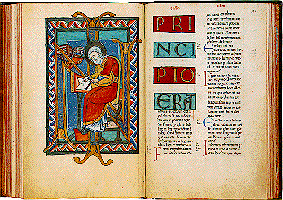II. God's Search for Man
a. God Reveals Himself
Though desiring God, we could never find him on our own. Without his help we live shallow and pointless lives, never understanding from where we came or where we are going. We could never be satisfied living like that and he could never be satisfied watching us live like that. So, out of his infinite love, he has gradually revealed himself to us, allowing us to find true happiness and answer the ultimate questions which we have about our own existence. He first showed himself to our first parents, Adam and Eve, the ancestors of every human being. After the fall, he promised them salvation (Gn 3:15) and assisted them in their lives, now marred by sin (Gn 3:21). Through Noah he made a covenant to all living beings (Gn 9:1-17). He made his covenant with Abraham that his descendants in faith would be more numerous than the stars (Gn 15:1-21), and today they are as Jews, Christians, and Muslims. Through Israel he established a holy people of his own, the Jews, and through the prophets he promised them and all of us salvation and the future coming of his kingdom through the Messiah. Through Moses he gave us his perfect law, that is, the Ten Commandments (Ex 20:1-17). Finally, his revelation was culminated and fulfilled in the coming of that Messiah, Jesus Christ, the only Son of God (cf. Heb 1:1-2). He is God's final and definitive word, because he himself is the Word of God made man (Jn 1:1, 14). In him God established a new covenant with us which will last forever. There will be no further public revelation.

Abraham prepares to sacrifice his son, a prefigurement of Christ
b. God's Revelation is Sustained
Once God's message, that is, the gospel, was completed in the person of Jesus Christ, it was entrusted to his closest friends, the apostles. After being filled with the Holy Spirit at Pentecost they went out into the world to spread the gospel to every corner of the earth, as symbolized by the speaking in the many different tongues (Acts 2:1-13). The early church expanded rapidly by the power of the Holy Spirit as the apostles took the word to the world, converting Jews and Gentiles alike to the new faith in Jesus Christ. They taught the faith both orally and by writing it down (cf. 2 Thess. 2:15). Some of these writings were inspired by the Holy Spirit and are now found in the 27 books of the New Testament. Because it was inspired by God, the New Testament, like the Old, truly is the Word of God and teaches the faith infallibly (2 Tim 3:16). However, not every aspect of the faith was committed to paper; much of it was taught in person by the apostles. Knowing that they were facing death from the Roman state and some Jewish leaders, they ordained new leaders to take their places and further the propagation of the gospel and expansion of the church. The passed on the full teaching of the gospel to these new bishops, who in turn, passed it on to more bishops (cf. 2 Tim 2:2), who passed it on to more bishops, all the way down to the present date. This full gospel can be found in the New Testament and this apostolic tradition perfectly preserved by the Catholic Church.
c. The Bible
The 46 books of the Old Testament and 27 books of the New make up the deposit of sacred scripture which was inspired by the Holy Spirit. They hold a central place within the life of the church because they are the Word of God and, as such, are able to teach God's truth perfectly and without error. The entire Bible, both Testaments, points towards Christ, the fulfillment of revelation. He is the one of whom the prophets spoke, the Messiah who would suffer vicariously for the sins of his people (cf. Is 52:13-53:12). As such, the Old Testament can only be understood in light of the New. By itself it is incomplete. Likewise, the New Testament cannot be understood without the groundwork laid by the Old. Both Testaments shed light on each other. The reading and veneration of the scriptures, especially the four Gospels which focus on the life, death, and resurrection of Christ, has always held an esteemed place within the life of the church and is essential for proper knowledge of God through Christ. Because they are historical books and speak of God's dealing in history, the scriptures must always be read within their historical contexts. Particularly, the New Testament must be read within the tradition of the church which wrote and compiled it. Study of the church fathers, ancient and modern, should accompany study of the Bible. Together, sacred scripture and sacred tradition form a whole which makes up the one deposit of faith given to us by Jesus Christ. The task of interpreting the scriptures within this tradition falls solely on the shoulders of the Magisterium of the Catholic Church, that is, the pope and bishops in communion with him. They are the ordained teachers of God's Word, and, guided by the Holy Spirit, always teach the faith perfectly, without possibility of error. The church never ceases to contemplate God's Word and come to a fuller understanding of it. Consequently, the Catholic Faith has steadily developed over the centuries, always moving forward and never veering off course.

Beautifully adorned sacred scripture

